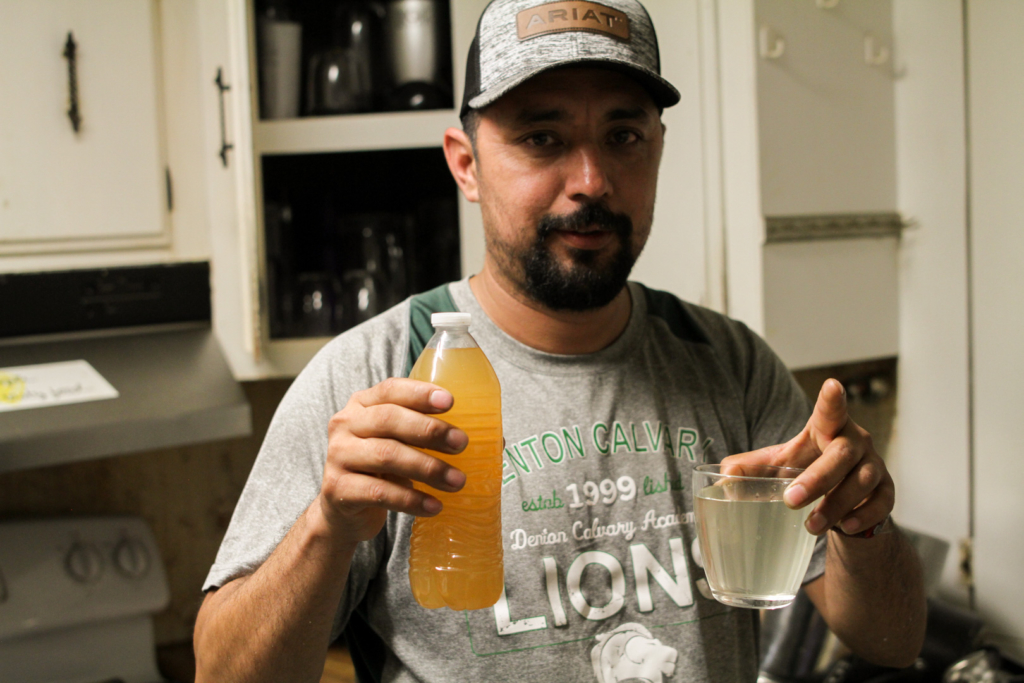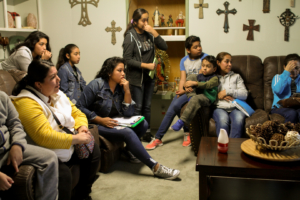
Images of foul, unsightly rust-colored water are widely associated with the Flint water crisis in Michigan. Unknown to many is the patchwork of thousands of poor “unincorporated” communities all over the United States that face the same problem as Flint residents: poisonous orange and yellow water coming out of the tap and a struggle for clean water and other public services.
Green Tree Estates, a Texas mobile home community with about 50 mostly Spanish-speaking residents is one such community. For several decades, the Green Tree Estates neighborhood was an unincorporated community, meaning that it was not incorporated into any city, town or village. As a result, the residents had virtually no access to municipal services (garbage, sanitation, fire protections, street repair, lights, water utilities, and so on), usually the principal function of a city.
Unincorporated communities thus fall under the jurisdiction of a county, which typically is less equipped to deliver these services. When residents of neglected unincorporated communities assert their right to basic public services, the county often refuses, citing jurisdiction and money or shifting responsibility to the residents themselves.
Unincorporated communities, with all their lack of infrastructure as well as health and safety risks, are attractive to many people who suffer severe discrimination in cities, particularly in housing. All over border states like Texas, unincorporated communities are populated by impoverished families, often Spanish-speaking, just like the residents of Green Tree Estates.
For more than 20 years, the working-class residents of Green Tree Estates have lacked a clean drinking water system. The majority own their own mobile homes or property, some are renters, but all have depended on the owner of multiple mobile home lots, the Roddy family, to supply water on behalf of Denton County from their privately owned and operated water well.
The water is pumped from an aquifer beneath the surface and old pipes distribute it to homes. The water has always been putrid and repellent. No one drinks it. But some poverty-stricken residents try to filter it and use it for bathing, washing dishes, and other things. The Roddy family has been fined over and over again for failing to bring their system into compliance, to no avail.
Six years ago, the fast-growing city of Denton annexed the Green Tree Estates neighborhood. Green Tree residents became Denton residents and began paying city taxes. Six years have passed, the water remains undrinkable, and other municipal services have failed to materialize.
The ordinance for the annexation required the Roddy family to install infrastructure to connect to the city of Denton’s water system. The Roddy family never lifted a finger. Not to be outdone in terms of criminal neglect, the city of Denton weaseled its way out of directly connecting residents to clean water by stating that the well and surrounding roads were all private. What could they possibly do? Their argument was that the private property rights of the Roddy family superseded the rights of the rest of the community to clean drinking water.
That is capitalism in a nutshell.
Meanwhile, residents reported that the dirty yellow and orange water is so contaminated that it has caused sores and blisters on the bodies of children when they come into contact with it. For Green Tree residents this is an issue of urgency that profoundly affects the health, school performance, and quality of life of their children.
About one year ago, the Roddy family put their parcels up for sale. Recently, residents were notified that the Roddy’s would not be bringing the water system into compliance as required by the city, but would instead turn it off altogether. Adding insult to injury, the Roddy’s didn’t provide a 120-day notification as required by the Texas Public Utilities Commission. Ignoring neighborhood outrage, the Roddy’s shut the system down on Nov. 15.

Community organizes
This was an assault on the community’s dignity. A line had been crossed. The community began to organize.
Speaking with Liberation News after a November community organizing meeting, Edna, a Green Tree resident, said organizing efforts started when organizers from the League of United Latin American Citizens and Movimiento Cosecha approached her and explained that hope rested within the people and the community, and not in what the city was offering. The people can organize for their rights and win!
With the community energized and after six years of inaction, the Denton City Council was forced to respond to the water shutoff by declaring a local state of emergency. The city has authorized spending up to $250,000 over a 90-day period to provide temporary water services. That means each resident will be provided with a 275-gallon drum, which the city will refill several times a week. In order to allow trucks with water to access the neighborhood, the city has also had to improve the dirt roads.
The same city that for so many years has privileged private property over the fundamental right to water and life now has 90-days to develop a “long-term” solution. City staff will present their options to the Denton City Council on Dec. 10 or 17.
As for the residents of Green Tree, they are ready to carry on the fight for a dignified life and future for their children.
Edna is inspired by her neighbors and the struggle. The community itself is the reason she is fighting. “I can live without streets, without electricity, without waste management,” she said. “But without water we can’t live. Water is an indispensable resource and I do believe they are violating our rights. I don’t know if it’s because of racism, I don’t know if their reason is for profit, but my reason for fighting is my family, my neighbors and my community. That is why I am fighting!”





